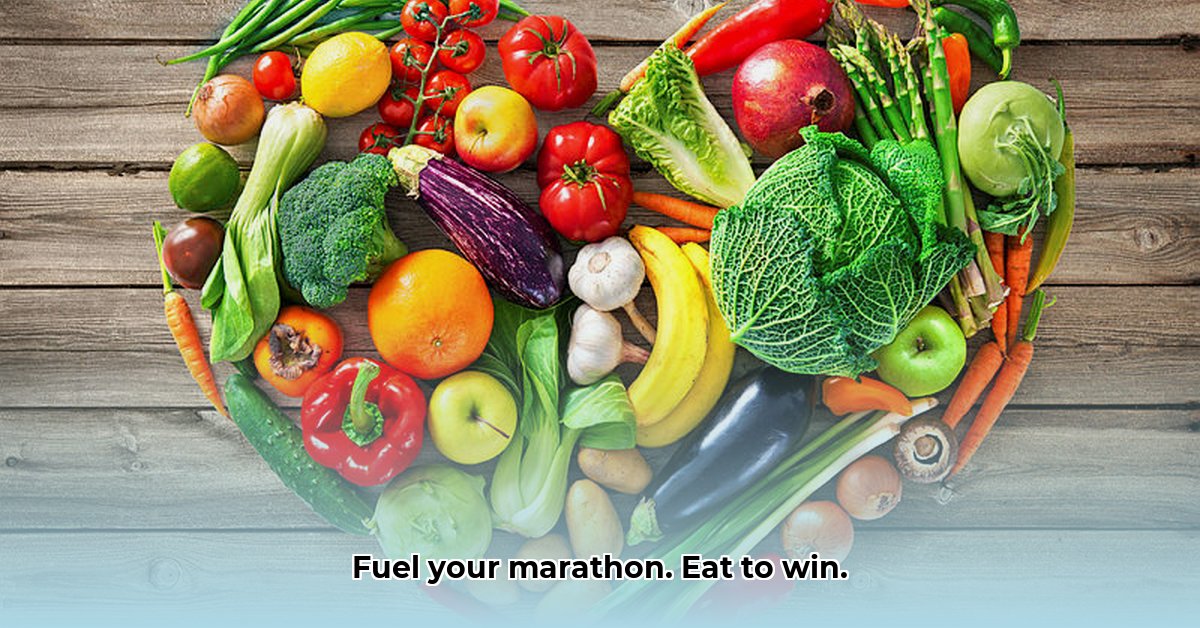Want to run a marathon and actually enjoy it? It’s not just about the miles; it’s about what you put in your body. This guide is your secret weapon for fueling your marathon training and race day. We’ll break down the science of eating right for runners – covering everything from the best foods to eat before and after your runs to creating a personalized plan that works for you. We’ll also show you how to avoid common pitfalls and get the most out of your training. Whether you’re a seasoned pro or just lacing up your shoes for the first time, get ready to learn how to eat your way to a successful marathon! For more tips on establishing healthy habits, check out this helpful guide.
Healthy Eating for Marathon Training: Fueling Your Run to Success
Marathon training is a huge undertaking, demanding both physical and mental strength. But even the most dedicated runner will hit a wall without the right fuel. This guide will help you understand the nutritional strategies that can power you to your personal best, focusing on a personalized approach because what works for one runner might not work for another. Let’s dive into marathon nutrition to help maximize your performance.
Macronutrients: Your Energy Trinity
Think of carbohydrates, proteins, and fats as your energy team. Each plays a vital role in your training and recovery. Understanding how many calories you should eat during marathon training requires some macronutrient education.
-
Carbohydrates: These are your body’s primary energy source, especially during those long runs. Aim for a higher percentage of your daily calories to come from carbs (around 55-70%). Focus on complex carbohydrates like whole grains, fruits, and starchy vegetables, which provide sustained energy release. Simple carbohydrates, such as those found in energy gels and sports drinks, are useful for quick energy boosts during longer runs.
-
Proteins: Proteins are the building blocks for muscle repair and growth. They’re crucial for recovering from those intense training sessions. A moderate intake of 1.4-1.7 grams per kilogram of body weight is generally recommended. Lean meats, fish, beans, lentils, tofu, eggs, and Greek yogurt are all excellent protein sources to contribute to muscle health.
-
Fats: Don’t be afraid of fats! Healthy fats provide sustained energy, support hormone production, and help your body absorb essential vitamins. Aim for around 20-30% of your calories from healthy fats. Think avocados, nuts, seeds, olive oil, fatty fish, and even dark chocolate in moderation.
Remember, these are guidelines, not rigid rules. The exact ratio will depend on factors like your body type, training intensity, and individual metabolism. The key is finding the balance that works best for you.
Pre-Run Fuel: Powering Up Your Endurance
For runs lasting over an hour, proper pre-run fueling is critical. You need easily digestible carbohydrates to prevent stomach upset. Experiment to find what sits well with your system. Here are some ideas:
-
2-3 hours before: A larger meal consisting of complex carbohydrates and some protein. Good choices include oatmeal with fruit and nuts, whole-wheat pasta with a light sauce, or a sweet potato with lean protein.
-
1 hour before: A smaller, easily digestible carbohydrate snack. Examples include a banana, a piece of toast with jam, or an energy bar.
-
30 minutes before: A quick source of energy, such as an energy gel or sports drink, can be beneficial right before you start running.
Avoid anything too high in fiber or fat, as these take longer to digest and may cause discomfort during your run. Practice your pre-run fueling strategy during training runs to ensure it works well for you on race day.
Post-Run Recovery: Rebuild and Replenish
Your body works hard during a run, and it needs to replenish its energy stores afterward. Aim for a carb-to-protein ratio of 3:1 or 4:1 within 30-60 minutes of finishing your run. This helps restore glycogen levels and kickstart muscle repair.
Here are some recovery meal and snack ideas:
-
Smoothie: Blend together berries, protein powder, spinach, banana, and almond milk.
-
Sandwich: Turkey or chicken breast with avocado, lettuce, and tomato on whole-wheat bread.
-
Greek yogurt with fruit and granola: This combines protein, carbs, and healthy fats.
-
Chocolate milk: An excellent source of both carbohydrates and protein.
Consume your post-run meal or snack within the critical window to maximize its benefits.
Hydration: The Unsung Hero
Hydration is just as vital as nutrition. Dehydration can lead to fatigue, cramps, and even injury. Drink plenty of water throughout the day, especially before, during, and after your runs.
-
Before: Drink 16-20 ounces of water 2-3 hours before your run.
-
During: Drink 4-6 ounces of water or sports drink every 20 minutes during your run.
-
After: Drink 16-24 ounces of fluid for every pound of weight lost during your run.
For longer runs, consider adding electrolytes to replenish what is lost through sweat. Sports drinks, electrolyte tablets, or even salty snacks can help with this. Remember to consider what fluids have the best combination of both water and electrolytes.
Listen to your body; thirst is a clear signal to drink. Don’t wait until you feel parched. Carry a water bottle during your runs, and adjust fluid intake according to the weather and duration of your workout.
Personalized Nutrition: The Key to Success
There’s no one-size-fits-all approach to marathon training nutrition. What works for one runner may not work for another. The secret is to experiment and discover what energizes your body and supports your training.
-
Keep a journal: Track your food intake, training mileage, and your training performance. Note how you feel before, during, and after each run. Look for patterns. What foods give you sustained energy? Which ones cause stomach problems?
-
Listen to your body: Pay attention to your hunger and fullness cues. Don’t ignore your body’s signals. If you feel hungry, eat. If you feel full, stop.
-
Consult a professional: Consider working with a registered dietitian or sports nutritionist. They can help create a personalized plan tailored to your individual needs and goals.
Carb Loading: To Load or Not to Load?
Carb loading is a strategy used to maximize glycogen (muscle fuel) stores before a race. It’s most effective for races lasting longer than 90 minutes.
-
The week before: Gradually increase your carbohydrate intake to 70-85% of your total calories.
-
The day before: Focus on easily digestible carbohydrates like white rice, pasta, and bread.
-
Avoid: High-fiber foods, which can cause gastrointestinal distress.
For most runners, maintaining a consistent intake of carbohydrates through a balanced diet is perfectly sufficient.
Sample Daily Meal Plans (Use as Inspiration!)
These are just examples – adapt them to your preferences and individual needs. Pay attention to the timing of your meals in relation to your training schedule.
| Meal | Option 1 | Option 2 | Option 3 |
|---|---|---|---|
| Breakfast | Oatmeal with berries, nuts, and seeds | Whole-wheat toast with avocado and a fried egg | Greek yogurt with honey and fruit |
| Lunch | Large Salad with grilled chicken or fish | Leftover dinner | Lentil soup with whole-grain bread |
| Dinner | Baked chicken breast with roasted vegetables | Salmon with quinoa and steamed broccoli | Vegetarian chili with brown rice |
| Snacks | Apple slices with peanut butter | Rice cakes with avocado and everything bagel spice | Hard-boiled eggs, trail mix |
Common Pitfalls and How to Avoid Them:
| Pitfall | Potential Causes | Solution |
|---|---|---|
| Gastrointestinal Distress | High-fiber foods, improper pre-run fueling, dehydration | Experiment with different foods; eat smaller portions before runs; stay hydrated. |
| Underfueling | Insufficient calorie intake, inadequate carbohydrate consumption | Increase calorie intake gradually; consume more carbohydrate-rich foods. |
| Overfueling | Excessive calorie intake; overly large portion sizes | Adjust portion sizes; focus on nutrient-dense foods; listen to your body. |
| Muscle Cramps | Electrolyte imbalance, dehydration | Consume electrolyte-rich drinks or snacks; stay adequately hydrated. |
| Fatigue | Iron deficiency, insufficient calorie intake | Eat iron-rich foods; consider iron supplementation (under medical supervision); ensure adequate calorie intake. |
Marathon training is a journey, not a sprint. Prioritize your nutritional needs, and remember that consistency and a personalized approach are key to success. Pay attention to your body’s signals, adjust your strategy as needed, and enjoy the journey!
How to Personalize Your Marathon Training Diet for Optimal Performance
Key Takeaways:
- Carbohydrates are your primary fuel source. Experiment to find the right amount for you.
- Protein is crucial for muscle repair and recovery. Don’t skimp on it!
- F
- Compartment Food Containers Make Meal Prep and Lunch Packing Easy - February 10, 2026
- Divided Lunch Containers Revolutionize Your Meal Prep Strategy - February 9, 2026
- Divided Food Storage Containers Transform Meal Prep and Portion Control - February 8, 2026










